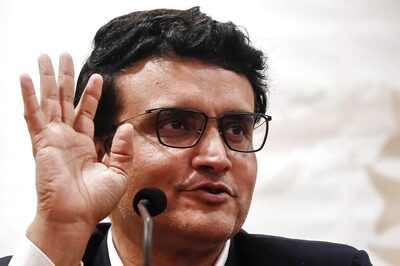
views
Heated debate over fossil fuel phase-out, and push for climate finance rocked the late-night negotiations at COP28, as countries demanded a revised draft to be put on the table. The two-week-long conference in Dubai is all set to run into overtime as countries struggle to broker a final deal on the last day on Tuesday.
While the COP28 Presidency has managed to include fossil fuels in the draft text for the first time, the language chosen for action has left countries deeply divided. A strong deal on fossil fuel phase-out was expected to be a key highlight of the summit. “When we released it (the text), we knew opinions were polarised…but what we did not know was where each country’s red lines were. We got parties to come to us quickly with those red lines. We spent last night taking in that feedback and that has put us in a position to draft a new text,” COP28 Director-General Ambassador Majid Al Suwaidi told the media.
The COP28 Presidency is now racing against time to deliver a revised text as the two-week-long conference enters its last day. Strong pushback from majority of the countries to the last draft forced the negotiators to return to the drawing board and spend hours to re-work the deal. The revised draft – fifth in line – is expected to be released in the evening.
The developing countries in the Global South have sought a moderation of the entire Para 39, which lists multiple options that countries could take to reduce greenhouse gas emissions. The options include tripling renewable energy capacity by 2030, rapidly phasing down unabated coal, Net Zero by 2030, and phasing out inefficient fossil fuel subsidies. The key concern for developing countries is that the principles of equity, climate justice and Common but Differentiated Responsibilities (CBDR) should be reflected in all provisions of the text. They also stressed that the text should not dictate the Nationally Determined Contributions (NDCs), which should be in line with varying national circumstances.
“The text on GST at this stage is merely a collection of multiple options on actions for mitigation, adaptation and financing. It lacks clear recommendations on the extent by which developed countries should reduce their emissions consistent with global goal. It needs a lot of work to bring target oriented focus on adaptation and financing. For a change, it includes a language on prevention of unilateral trade actions which is welcome,” said RR Rashmi, Distinguished fellow, The Energy And Resources Institute (TERI).
“This agreement would decide the future course of direction. With different possibilities being given as a menu, it looks like we are heading to a catastrophe, which if not corrected now will have inseparable consequences. We need a strong stance and every country has to play their bit,” said Vibhuti Garg, Director, South Asia at the Institute for Energy Economics and Financial Analaysis (IEEFA).
According to a senior negotiator, the call from the Global South is to urge the rich and the developed countries to take the lead in raising their climate ambition, and reach Net Zero before 2050. With the long-promised $100 billion yet to be realised, the onus lies on developed countries to fulfil their pre-2020 pledges especially on climate finance.
The recently-concluded G20 summit in New Delhi had already stepped up the language around climate finance from billions to trillions. The New Delhi Declaration had also noted the need for $5.8-5.9 trillion in the pre-2030 period for developing countries to achieve their Nationally Determined Contributions (NDCs) and $4 trillion per year for clean energy technologies by 2030 to reach net zero emissions by 2050.
“All COPs are challenging, but in this COP we are trying to do something that has never been done before…something historic. We are trying to agree on a comprehensive plan to close the gaps between where the world is, and where it needs to be to keep 1.5 degrees within reach. That is our North Star. That has been our North Star all along. Part of this is to include language on fossil fuels in the text. If we can, that would be historic,” said Ambassador Suwaidi, adding that the COP28 Presidency wants to deliver an outcome that makes everybody happy.


















Comments
0 comment